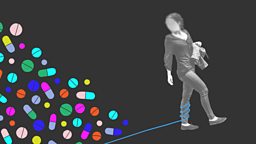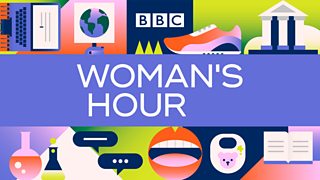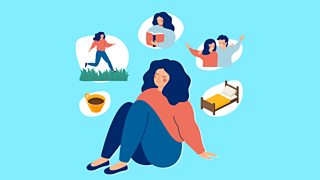‘I felt so unable to help’: How my daughter became addicted to Xanax after taking it to deal with anxiety
Warning: This article contains themes that could be upsetting.

A listener we’re calling Christina contacted Â鶹ԼÅÄ Radio 4’s Woman’s Hour after she heard a recent File on 4 documentary about addiction to benzodiazepines (otherwise known as Street Valium). Christina recognised what she heard.
Her teenage daughter, who we are calling Beatrice, became addicted to a drug called Alprazolam (commonly known as Xanax) after taking it to deal with the extreme anxiety she experienced about school during and after the coronavirus lockdown.
After realising she was addicted, Beatrice sought help from a young person’s drug programme and was given a high dose of diazepam, commonly known as Valium, to replace the Xanax. This was reduced under medical supervision. Beatrice felt depressed and tried to take her life six times.
Christina says she wants to highlight her daughter’s experience to prevent it from happening to other children and families. She told Emma Barnett about what her family went through and the impact it had on them. Keep reading to find out more about their story...
'We didn't understand how deep [her anxiety] became'
Beatrice was about to start her GCSE exams when the coronavirus pandemic began and her exams were cancelled. She had always shown signs of anxiety and had accessed support from her GP, but the pandemic had a big impact.
She was somebody that we didn't worry about, in a way, because she always exhibited good judgement.
“It really emphasised that sense of anxiety - not having control over what's happening, the feeling that you might pass on an illness, and not being at school in that social setting,” says Christina. “With that change being away from school, the sense of anxiety became really intense and perhaps we didn't understand how deep that became.”
'It was a friend who suggested she try Xanax'
Christina says that her and her partner were not worried about Beatrice as she didn’t show any signs that she was struggling. It can be difficult to tell when someone is using a benzodiazepine, as there are few obvious physical symptoms.
“She was somebody that we didn't worry about, in a way, because she always exhibited good judgement. We felt that things were fine, but she was in her second year of A-Levels and not feeling comfortable about going into school. She talked about situations where she had panic attacks and she had to run out of lessons because she was scared that she was going to be asked something by the teacher.
“I think it was a friend who suggested she try Xanax and she felt less anxious initially. It must have felt like that fear subsided. But because Xanax wears off very quickly, the addiction can build up very quickly.”

‘We had no idea she was taking it’
Beatrice had been taking the drug for four months by the time her parents found out.
We hardly saw her. Looking back, she sort of disappeared.
“During that time she was quite absent,” says Christina. “We hardly saw her. She had meals with us. But looking back, she sort of disappeared. I felt she wasn't there. We never imagined there would be an issue around drug taking.
“I think she realised that she was taking more and more of it. She told me that she'd made an appointment with one of the teachers and when she came back, she told me that she'd been using Xanax.”
‘I didn’t know what it meant’
Over the four months Beatrice was taking Xanax, her body became dependent on the pills. For someone who is addicted to a benzodiazepine, stopping taking the drugs can lead to withdrawal symptoms, from headaches, nausea and depression to more severe side effects, such as seizures and psychosis.
“She was unable to come off it on her own,” says Christina. “She realised that she had no control, and that she was no longer herself. That's how she described it. She felt she was no longer her. So, she'd signed up with a drug rehabilitation support service locally.
“It had to be a slow withdrawal. She was put on diazepam as an alternative as it has a much longer lifespan so you can take less of it, or the impact of it lasts for longer.
"I didn't know much about it. I was on Google researching and feeling very concerned. We talked to her around how we could support her. But we had been totally complacent about her health, about her wellbeing, because she was doing the basics that suggested she was she was fine and we were very wrong.”

'I think she realised that she was out of control'
Once she started to take diazepam to slowly withdraw from drug use, Beatrice’s mental health was severely impacted.
It starts as: ‘Oh, this feels a bit better.’ But it can creep up on you.
“She became suicidal,” says her mother Christina. “She became really, really depressed. I think she realised that she was out of control and didn't know how to manage the feelings of guilt and fear and anxiety. The more immediate impact was worse because she did make attempts, or self-harm.
“We had a number of occasions where we went to A&E and she had support through really brilliant services. The crisis team, the psychiatrist, and all of the health professionals were extremely supportive given this vulnerability for her.”
'It was a really terrifying time'
Whilst Beatrice is no longer on Xanax or diazepam, the experience has had a profound effect on Christina and their whole family.
“I felt so ignorant, and I felt so unable to help. As a parent, you feel guilty that this has occurred under your roof and you've not recognised it, you've not been able to help.
“It took about four months to withdrawal from diazepam, during which time she became agoraphobic, she dealt with a lot of aches and pains and was extremely anxious and hyper vigilant. It was a very difficult journey. But since then, she’s in a really good state of mind. We’ve talked a lot about what happened.
“She's much better now. Despite all of these difficult occurrences, she achieved really brilliant A-Level results and she's deferred a university place.”
'It’s a real danger for young people'
Some people believe that these pills are less dangerous than illicit drugs, such as cocaine. However, this false sense of security isn't justified as obtaining pills via the internet doesn't come with the same quality checks that legitimate medicines have. This means the dose can vary and there could be other adulterants in these pills that can cause harm.
Christina is hoping that by speaking so openly about her daughter’s addiction and the impact it had on their family, it could stop this from happening to other children and their families.
“It's a real danger for young people. In our case, our daughter was not taking recreational drugs. It’s insidious, because it starts as: ‘Oh, this feels a bit better.’ But it can creep up on you.
“In lots of different ways, she so easily could have died. There were points after suicide attempts where I was just thinking: ‘Well, if this keeps on happening, this is only going to get worse. It's a really, really dangerous situation.”
If you or anyone you know has been affected by the topics covered in this article, you can find more information and support by following the links below:
To listen to Christina and Beatrice’s story on Â鶹ԼÅÄ Radio 4’s Woman’s Hour, head to Â鶹ԼÅÄ Sounds – it's the episode from Wednesday 30 November. You can join the conversation on Twitter and Instagram @bbcwomanshour.





